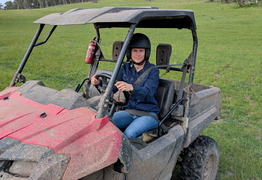Life with Parkinson's Disease in Australia
Kimberly Grabham
15 April 2025, 8:00 PM

An estimated 200,000 people live with Parkinson’s Disease in Australia. One in five people are diagnosed before 50, and the disease is the second most common neurological condition after dementia.
While the ‘average’ experience involves motor symptoms like tremors, rigidity, and slowness of movement, along with potential non-motor symptoms such as mood changes and fatigue, every individual's journey is unique.
This is poignantly illustrated by the recent experience of a local aged-care worker who suspected she might have Parkinson's after witnessing family members live with the disease.
Initially, she wasn't overly concerned when she went for testing.
However, her anxiety escalated when her GP's receptionist contacted her urgently the morning after her appointment.
“It was then I started to worry and all I could think about on the trip to Deniliquin was I had a brain tumour like my sister,” she recounted.
In a surprising turn, her fears were allayed when she received the diagnosis of Parkinson's disease. Her relief was so palpable her doctor asked if she had understood correctly.
For many Australians, the experience of Parkinson's disease encompasses a range of common symptoms.
These are broadly categorised into motor and non-motor symptoms.
Motor symptoms include tremors, rigidity: Stiffness and resistance to movement can affect the limbs and trunk, slowness of movement can make everyday tasks challenging, difficulty maintaining balance, changes in walking patterns, such as shuffling or taking small steps.
Non-motor symptoms are mood changes, fatigue, sleep disturbances, cognitive difficulties, sensory issues and gastrointestinal problems.
Parkinson's disease is progressive, however, the rate of progression varies significantly from person to person, with some experiencing a slower advancement while others face a more rapid decline in function.
Managing Parkinson's disease typically involves a multi-faceted approach. Medications are often prescribed to help control motor symptoms like tremors and rigidity.
Therapy, including physical and occupational therapy, plays a vital role in improving mobility, balance, and coordination.
Regular exercise, a healthy diet, and maintaining social connections, can also significantly contribute to overall well being.
In certain situations, surgical interventions may be considered to help manage symptoms.
In the Australian context, while the average age of diagnosis is 65 years, it's important to note that younger individuals can also be diagnosed with Parkinson's.
As the local woman, who does not wish to be identified, stated with resilience, ‘Life is for living with what you've been dealt and I am focused straight ahead’.
NEWS
SPORT
RURAL
COMMUNITY
VISIT HAY
VISIT BALRANALD
VISIT OUTBACK NSW
EVENTS
LOCAL WEATHER
FOR SALE
COMMERCIAL PROPERTY


































